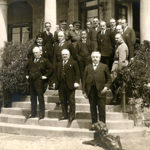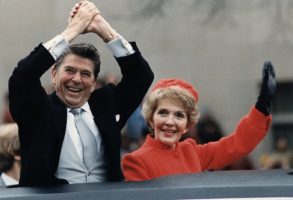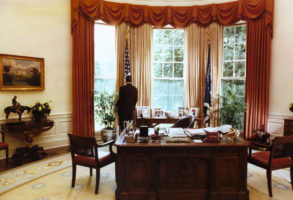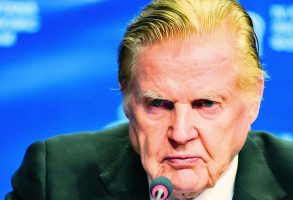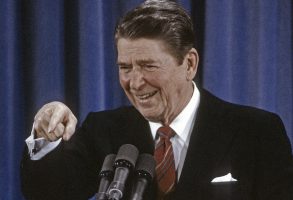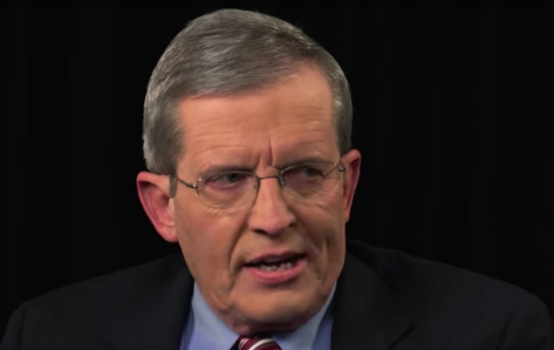
Published February 17, 2018
To those who knew him well, Jeffrey L. Bell was a real-life George Bailey: an accomplished and decent man who shaped important events by helping others achieve their own greatness, mostly without recognition himself.
I knew Jeff exactly 40 years, almost half his life and (so far) two-thirds of mine. The fictional George Bailey in the movie It’s a Wonderful Life saved the life of his kid brother, who went on to be a war hero, meanwhile George fought the Battle of Bedford Falls, keeping it from becoming a sleazy Pottersville. Like him, Jeff had the gift of making it possible for great men, notably Ronald Reagan and Jack Kemp, to achieve their own greatness, while helping many lesser lights to shine brighter than they ever thought they could.
As Jeff told it, he ran for Senate in 1978 because his last job, for Ronald Reagan in 1976, had made him unemployable, after Jeff’s plan to return $90 billion worth of federal programs to the states was blamed for Reagan’s defeat by Gerald Ford. Jeff defeated incumbent Senator Clifford Case in the 1978 New Jersey GOP primary race, after which he hired me as his 25-year-old press secretary for the general election, when he faced New York Knicks basketball star and former Rhodes Scholar Bill Bradley.
Among my first assignments was arranging a press conference on the muddy river bank below the Tacony-Palmyra Bridge, in order to demonstrate how charging a lower price for a public service like a toll road could pay for itself because so many more people used the bridge than a nearby span that charged a much higher toll.
This was an example of what Jeff called the “simplicity beyond complexity.” A political campaign couldn’t be about umpteen different things: you had to choose the two or three issues that were the most important and easy enough to explain to voters.
Yet Jeff could handle complexity. His knowledge of American political history was encyclopedic. And one of the best decisions I made before publishing my own book was to ask Jeff to proofread the manuscript. “I’m a frustrated schoolmarm,” he explained apologetically after he found dozens of typographical errors which had escaped my notice and the publisher’s proofreader. Thanks to Jeff, there wasn’t a single typo to correct when the second edition was published.
Though it’s hard to imagine in the current political climate, Jeff and Bill Bradley conducted a series of debates which were local equivalents of the Lincoln-Douglas debates in quality, vigor, and decorum. When Bradley won, both Jeff and I were unemployed. But after the election, Jack Kemp hired me as his speechwriter, a position I held before and during both Reagan administrations.
I was able to witness how Jeff, with Elliot Curzon, drafted and filmed some 30-second television ads (including one calling for the gold standard) which helped Reagan win the 1980 New Hampshire primaries.
Another important contribution to Reagan’s greatness was Jeff’s role in passing the Tax Reform Act of 1986. As a result of their 1978 campaign, Jeff and Bradley developed a mutual trust, and Bradley (after voting against the Reagan tax reform of 1981), developed a Democratic party prototype tax reform plan with Congressman Dick Gephardt, but faced a problem within the Democratic party parallel to Jack Kemp within the Republican party, who had proposed a Republican tax reform prototype: getting and keeping tax reform on the agenda of the party’s leadership and presidential candidates. Jeff was an important conduit of contact between Kemp and both Bob Packwood and Bill Bradley at the Senate Finance Committee, and without his efforts the astonishing passage by a 97-2 vote would not have happened.
The 1986 tax reform was passed with the support of Reagan Democrats and it lowered the top marginal tax rates from 50 percent to 28 percent (33 percent including benefit phaseouts, thus getting rid of the “Warren Buffet’s Secretary Problem”: the fact that she pays top tax rates on her wages roughly twice as high as his).
It was mostly Jeff’s idea to form a consulting firm, which started as Bell Mueller Cannon, Inc., (the fourth partner was Frank Cannon) but became Lehrman Bell Mueller Cannon, Inc. (finally LBMC LLC), after Lewis E. Lehrman, a man the caliber of Alexander Hamilton, left Morgan Stanley to join the new boutique firm.
“You’ve been mumbling for years about these dollar reserves,” Jeff told me. “Look. We’ve tried for years and failed to get U.S. policymakers to change the policy. Why don’t we start a consulting firm to predict the economic and political consequences of their policy errors?” “Nah,” was my immediate response. “If anybody could do that, they’d already be doing it. “ Which was stupid, since any one of us has a job only because we can do something better than anyone else available.
Lehrman Bell Mueller Cannon, Inc., became LBMC LLC in 2000 after Jeff and Frank amicably parted to pursue their primary interest, political consulting, while I, in partnership with Lew, pursued economic and financial market forecasting until I retired in 2015. In 2005 I also started the Economics and Ethics Program at the Ethics and Public Policy Center.
No discussion of Jeff would be complete without mentioning his deep and orthodox Catholic faith. I know that many who are habitual pearl-clutchers view the lay organization Opus Dei (“God’s Work”) as a kind of cult. In fact, it’s essentially a Catholic lay order of George Baileys, who think they can best live the same way as the faith’s founder, who lived most of his life as an unremarkable craftsman in a hick town on the fringes of the Roman empire. Jeff married Rosalie O’Connell in 1983, who is as close to the fictional character Mary Bailey in real life as Jeff was to George Bailey.
Jeff’s final political battle was the Battle of Leonia (NJ) in 2014, when he beat four other candidates in the GOP primary to become the Republican Senate nominee. As Jeff told it, he realized he had to run again himself after failing to convince any other GOP candidate to adopt the two issues in which he correctly saw the futures of the United States and the Republican party: social issues (above all ending legal abortion) and restoring the gold standard, while ending the dollar’s role as chief official reserve currency.
What the hell was that all about? It was about the simplicity beyond complexity. Jeff’s message was that we don’t have umpteen issues to solve, but two big ones.
First, though we’re not in as bad shape as some industrial countries, the United States has fallen below the birth rate necessary to reproduce itself. True, the abortion rate has fallen from its peak around 1980, when fully one-third of all U.S. children were aborted before birth. But the remaining one-sixth still spells the difference between a shrinking and a growing U.S. population. The rate of U.S. economic growth has also been proportional over long periods to the U.S. birth rate, so our “demographic winter” explains most of our lagging economic growth.
Second, as Lew Lehrman’s mentor, the French economist Jacques Rueff, first demonstrated, the repeated episodes of commodity inflation (or less often, deflation) are the direct result of the world’s central banks’ purchases or sales of U.S. dollar securities. The fact that when, say, the People’s Bank of China buys $1 trillion worth of U.S. securities, there must be an equal deficit in U.S. net exports is known as the “Triffin Dilemma.” Predicting the consequences was my bread and butter for more than 25 years.
But the problem is worse: the dollar’s reserve-currency role has also caused the deindustrialization of the United States, just as the pound sterling’s earlier reserve-currency role once caused the deindustrialization of the United Kingdom. So-called “core” inflation has declined, not because of adroit manipulation by the Federal Reserve, but because “core” inflation is driven by the level of manufacturing employment, which has fallen. The dollar’s reserve role has caused the price of American manufactured goods to sextuple since 1955, while the price of German manufactured goods tripled. This is why President Trump’s economic initiatives will be powerless to make good on his claim to restore American industry and end the chronic U.S. trade deficit.
Most voters would not understand all these connections. But Jeff did, and thought they could be explained to American voters. Rather than tracing the whole thing, he focused on the simplicity beyond complexity: there are two issues necessary to make America great again. Until the end, like George Bailey, Jeff Bell tried to help everyone else achieve their own greatness. That was his.
John D. Mueller is the Lehrman Institute Fellow in Economics at the Ethics and Public Policy Center in Washington DC, and author of Redeeming Economics: Rediscovering the Missing Element (ISI Books, 2014).








